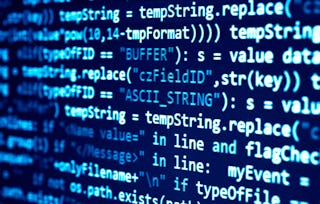This course will provide a set of foundational statistical modeling tools for data science. In particular, students will be introduced to methods, theory, and applications of linear statistical models, covering the topics of parameter estimation, residual diagnostics, goodness of fit, and various strategies for variable selection and model comparison. Attention will also be given to the misuse of statistical models and ethical implications of such misuse.

Modern Regression Analysis in R

Modern Regression Analysis in R
This course is part of Statistical Modeling for Data Science Applications Specialization

Instructor: Brian Zaharatos
8,529 already enrolled
Included with
32 reviews
Recommended experience
What you'll learn
Articulate some recommended practices for ethical behavior and communication in statistics and data science.
Interpret important components of the MLR model, including the “systematic” and “random” components of the model.
Describe and implement testing-based procedures for model selections and select a “best” model based on a given procedure.
Skills you'll gain
Details to know

Add to your LinkedIn profile
2 quizzes, 9 assignments
See how employees at top companies are mastering in-demand skills

Build your subject-matter expertise
- Learn new concepts from industry experts
- Gain a foundational understanding of a subject or tool
- Develop job-relevant skills with hands-on projects
- Earn a shareable career certificate

There are 6 modules in this course
In this module, we will introduce the basic conceptual framework for statistical modeling in general, and for linear regression models in particular.
What's included
8 videos4 readings1 quiz1 assignment2 programming assignments1 peer review1 discussion prompt1 ungraded lab
In this module, we will learn how to fit linear regression models with least squares. We will also study the properties of least squares, and describe some goodness of fit metrics for linear regression models.
What's included
9 videos2 assignments1 programming assignment1 peer review1 ungraded lab
In this module, we will study the uses of linear regression modeling for justifying inferences from samples to populations.
What's included
8 videos1 reading2 assignments1 programming assignment2 peer reviews1 ungraded lab
In this module, we will identify how models can predict future values, as well as construct interval estimates for those values. We will also explore the relationship between statistical modelling and causal explanations.
What's included
6 videos1 assignment1 programming assignment1 peer review1 ungraded lab
In this module, we will learn how to diagnose issues with the fit of a linear regression model. In particular, we will use formal tests and visualizations to decide whether a linear model is appropriate for the data at hand.
What's included
6 videos1 quiz1 assignment1 programming assignment1 peer review1 ungraded lab
In this module, we will study methods for model selection and model improvement.. In particular, we will learn when and how to apply model selection techniques such as forward selection and backward selection, criterion-based methods, and will learn about the problem of multicollinearity (also called collinearity).
What's included
10 videos2 assignments1 programming assignment1 peer review1 ungraded lab
Earn a career certificate
Add this credential to your LinkedIn profile, resume, or CV. Share it on social media and in your performance review.
Build toward a degree
This course is part of the following degree program(s) offered by University of Colorado Boulder. If you are admitted and enroll, your completed coursework may count toward your degree learning and your progress can transfer with you.¹
Instructor

Offered by
Explore more from Probability and Statistics
 Status: Free Trial
Status: Free TrialUniversity of Colorado Boulder
 Status: Free Trial
Status: Free TrialArizona State University
 Status: Free Trial
Status: Free TrialUniversity of Colorado Boulder
 Status: Free Trial
Status: Free TrialUniversity of Colorado Boulder
Why people choose Coursera for their career

Felipe M.

Jennifer J.

Larry W.

Chaitanya A.
Learner reviews
- 5 stars
78.12%
- 4 stars
9.37%
- 3 stars
0%
- 2 stars
6.25%
- 1 star
6.25%
Showing 3 of 32
Reviewed on Apr 29, 2024
A lot of work with several peer reviews, but it get you into R for Regression Analysis. Well laid out course. need knowledge of Linear algrebra for this course.

Open new doors with Coursera Plus
Unlimited access to 10,000+ world-class courses, hands-on projects, and job-ready certificate programs - all included in your subscription
Advance your career with an online degree
Earn a degree from world-class universities - 100% online
Join over 3,400 global companies that choose Coursera for Business
Upskill your employees to excel in the digital economy
Frequently asked questions
To access the course materials, assignments and to earn a Certificate, you will need to purchase the Certificate experience when you enroll in a course. You can try a Free Trial instead, or apply for Financial Aid. The course may offer 'Full Course, No Certificate' instead. This option lets you see all course materials, submit required assessments, and get a final grade. This also means that you will not be able to purchase a Certificate experience.
When you enroll in the course, you get access to all of the courses in the Specialization, and you earn a certificate when you complete the work. Your electronic Certificate will be added to your Accomplishments page - from there, you can print your Certificate or add it to your LinkedIn profile.
Yes. In select learning programs, you can apply for financial aid or a scholarship if you can’t afford the enrollment fee. If fin aid or scholarship is available for your learning program selection, you’ll find a link to apply on the description page.
More questions
Financial aid available,

